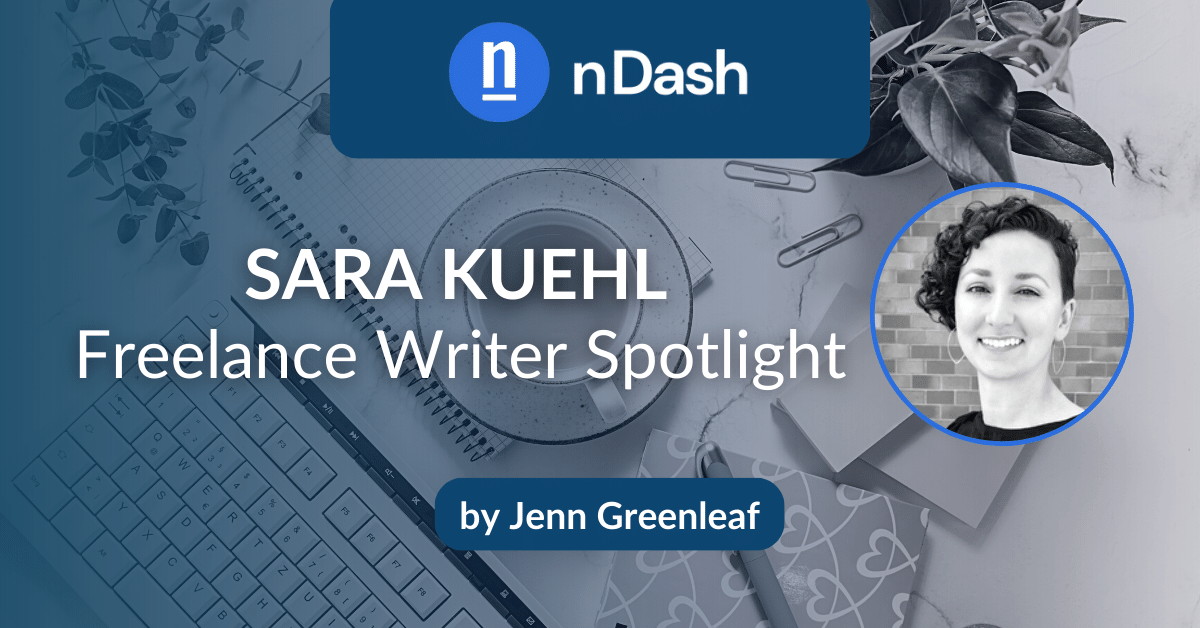nDash’s Managing Editor, Jenn Greenleaf, talks to Sara Kuehl about her background as a freelance writer and much more!
Background: The Highlights
Sara Kuehl, a freelance writer, leverages her love of language to create impactful campaigns for mission-driven organizations. Combining strategic thinking with creative storytelling, she ensures every project exceeds expectations.
Deeply rooted in language, Sara holds English degrees (Master’s & Bachelor’s), fueling her passion for writing, storytelling, and grammar. Her academic background ensures credibility, thorough research, and clean, well-crafted copy. This foundation, coupled with 15 years of experience, makes her adept at navigating language complexities for impactful results.
nDash’s Discussion with Sara Kuehl
Jenn: What inspired you to transition from a marketing manager to a freelance writer, and how has your previous experience influenced your current work?
Sara: As a marketing manager, I did it all: strategy, branding, writing, social media, project management, event planning, etc. I enjoyed the dynamic role, but I missed being able to write more, which has always been a passion of mine.
Transitioning from a generalist to a specialist means I have a good understanding of marketing beyond writing. I’ve managed and collaborated with other creatives and value each team member’s contribution to the final product. I can serve as more of a strategic partner than a producer.
My experience also informs how I work with clients. I’ve been in their shoes, managing a team and juggling many priorities. So I strive to make their jobs easier by communicating early and often, meeting or beating deadlines, etc. I believe professionalism and reliability are as important as skill or creativity for a freelance writer.
Jenn: How do you balance creativity with adherence to grammatical rules in your writing, and when do you find it necessary to break these rules?
Sara: It’s all about context and audience. While I appreciate and understand grammar, copywriting is not academic writing. It needs to be relatable and conversational. We don’t always speak in complete sentences. We use slang. We end sentences with prepositions. Perfect grammar sometimes needs to take a back seat to maximize effectiveness.
Jenn: How did nDash become part of your journey as a freelance writer?
Sara: nDash offers a convenient way to connect with potential clients. So I can spend more time crafting compelling content and less time searching for clients.
The Rest of nDash’s Conversation with Sara

Sara’s 15-year journey boasts national recognition in strategic communications, advocacy, and marketing. Her versatility spans diverse content formats, from email newsletters to annual reports. Her dedication extends beyond meeting client expectations, ensuring each piece exceeds them. She has a wealth of knowledge, skill, and passion and is an invaluable asset to any project seeking compelling copy.
Jenn: Could you describe a project you found particularly challenging and how you overcame those challenges?
Sara: An ed-tech client was preparing to launch three online degree programs in a crowded higher education market. Positioning was crucial. Plus, this was shortly after COVID, when many students had negative experiences with online learning. I did a ton of research into competitors’ offerings and students’ pain points. Then I crafted an integrated campaign that differentiated these new programs and resonated with students who felt college was out of reach. It was so rewarding when the first students graduated from these programs!
Jenn: What strategies do you use to ensure your content is both engaging and aligns with the brand’s voice? (Especially in diverse sectors like higher education and non-profits.)
Sara: I dive into the client’s existing content to get a feel for their brand. I absorb the nuances of their style, noting any patterns or recurring phrases. I even read some content aloud to really hear their brand voice and tone. Brand style guides are also useful references. Then I rely on my research and years of practice to ensure the content engages the target audience. Client feedback—especially early in a collaboration—ensures the content captures their brand in an authentic way.
Jenn: Can you share an experience where your strategic communications skills were crucial to a project’s success?
Sara: I was working with an academic library that was temporarily relocating to a hockey rink (truly!) while the library building underwent two years of construction. This disruption confused and upset students (understandably so). Strategic communications were crucial to ease the transition and improve negative perceptions.
I devised a humorous hockey-themed campaign that embraced the unexpected situation and tapped into campus culture. The campaign raised awareness about the project and converted critics into fans. To the point that students said they would miss the temporary space when construction was over!
Jenn: What role do you believe social media plays in modern marketing, and how do you integrate it into your overall content strategy?
Sara: Social media plays an integral role in marketing. It builds brand awareness, engages your audiences, generates leads, and more. I use social media to determine what an audience needs, wants, and expects. This informs the content I create. Then social media becomes a channel to share that content and continue the conversation.
Jenn: How do you tailor your writing process when working on different types of content, like brochures versus webpages?
Sara: While conventions vary by the type of content, my writing process remains pretty consistent. I start with research to understand the brand, its audience, and what distinguishes them from competitors. Next, I outline the content to give my writing structure. I like to start with writing body copy, then intros, headlines, or subject lines last. Depending on the client, I will also collaborate with web designers or graphic designers to discuss the ideal length/layout and revise the copy as the piece takes shape.
Jenn: How do you measure the impact of your copywriting on an organization’s overall goals?
Sara: Key performance indicators (KPIs) like click-through rate and conversion rate are common measures of copywriting success. A/B testing can identify which headlines, copy, and CTAs are most effective, so we can iterate to improve conversions.
In enrollment marketing, conversions may be inquiries, campus visits, and applications that ultimately achieve the school’s enrollment goals. In nonprofit marketing, conversions may be service requests, donations, or volunteer sign-ups that help the organization serve more people or gain more support for its mission.
Jenn: What’s your process for developing a brand toolkit, and how do you ensure it’s effectively utilized across an organization?
Sara: Meeting with staff across the organization first ensures the toolkit will fulfill their needs and make their work easier. Plus, this approach builds buy-in early. Easy access, regular updates, and clear internal communication reinforce consistent use of the toolkit. The time and effort to create a toolkit pays off in the long run for small, strapped marketing teams.
Jenn: What are some common mistakes you see in content writing for non-profits and educational institutions, and how do you avoid them?
Sara: Nonprofits sometimes rely too heavily on data or policy. They try to convey the magnitude of the problem they’re working to solve without telling an individual’s story to illustrate it. I lean into ethical storytelling because stories engage our senses. We remember stories better than statistics. And we’re more likely to act when we connect with someone’s story.
Higher education content often assumes knowledge of college jargon. I try to meet students where they are, so they can make an informed decision. I also strive for empathy in my writing because choosing a school is an emotional, personal decision. Students are afraid of failing, concerned about fitting in, and worried about financial security. I use emotive writing to help students feel confident about their prospects and feel a sense of belonging on campus.
Jenn: What advice would you give to someone aspiring to be a freelance writer in the field of strategic communications and marketing?
Sara: Study human behavior—what makes people tick, what drives people to action. Learn how to persuade with emotion, not just logic. That will make your writing more strategic and effective.
Work with Sara Kuehl on nDash Today!
Do you have a project that aligns with Sara’s background? Check out her writer profile to see her work and how her experience can help level up your content strategy: Sara Kuehl.
